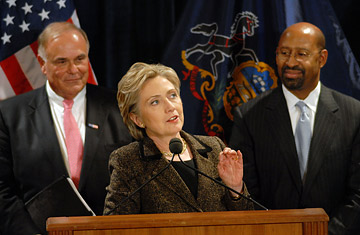
Hillary Clinton is endorsed by Pennsylvania Governor Edward G. Rendell and Philadelphia mayor Michael Nutter at Philadelphia City Hall on January 23, 2008 in Philadelphia, Pennsylvania
In a stark, unfinished office space in a gritty corner of Philadelphia along the Delaware River, Hillary Clinton supporters gathered last Sunday to plan a campaign that wasn't supposed to happen. "We cannot take anything, any area, any voter for granted," the city's newly elected mayor, Michael Nutter, told the crowd of perhaps 150. The race, he said, will be like this year's Super Bowl, in which the previously undefeated New England Patriots unexpectedly fell to the underdog New York Giants. And he means for the Pennsylvania's Clinton campaign to be the Giants. "We have our work cut out for us," he said. "But we have a real candidate who is a real person, and she really does care."
Campaign organizer Abe Dyk assured the crowd that the six-week run-up to the primary will be a full-bore, no-excuses campaign. "We will be Iowa on steroids ... everything we do in a traditional campaign after Labor Day we're going to start doing after March 4," the date of primaries in Ohio and Texas, he told the cheering crowd of activists.
In fact, the state's April 22 primary is shaping up to be another so-called decisive battle in the Democratic campaign. It is the single biggest prize in the next six weeks, with 103 delegates up for a vote. With her comeback victories in Texas and Ohio, Clinton needs a solid victory here to justify a potential triumph at the convention with a superdelegate strategy. Obama needs to counter that strategy by piling up the pledged delegates, to blunt any Clinton hold on the superdelegates that is based on momentum and growing popular support. "Neither Clinton nor Obama can afford to bypass [Pennsylvania]," said pollster and political analyst G. Terry Madonna of Franklin & Marshall College. "They can't afford to let it alone even though it won't give anyone enough pledged delegates for a victory at the convention." Madonna's latest poll, taken in mid-February, shows Clinton holding a good lead in Pennsylvania, 44 to 32 percent, but Obama has closed the gap since January, when he was 20 points down. Democratic consultant Larry Ceisler believes that by winning Texas and Ohio, Clinton proves she can win Pennsylvania.
Indeed, Pennsylvania and Ohio share very similar demographics. It appears that the campaign in this state will look much like the one just concluded in its neighbor, with a strong emphasis on economics and some sparring over national security. Clinton organizers in Pennsylvania were instructing volunteers early in the week to call Ohio and tell undecided voters that she will "deliver real solutions to the lagging economy and soaring home foreclosures," both issues that have affected Pennsylvania, particularly in the formerly industrial sections in the West and Northeast. Obama's statewide chairman, Congressman Patrick Murphy, predicted that the candidates will also continue the Ohio debate over the legacy of NAFTA, which blue-collar workers in Pennsylvania blame for the loss of textile jobs.
Money has been a problem for Clinton, with Obama far outraising her, but the results on Tuesday may change her fortunes as donors become more certain she can win. And Pennsylvania is generally thought to be a rich state for Democratic candidates looking for funds. Obama is "a money-making machine," Madonna said. "She would probably have a more significant problem, but she does have [Governor] Ed Rendell and his money-making boys" to help fund the fight.
Madonna said Obama is likely to do very well in Philadelphia, with a large African-American electorate, and may win in the city's suburbs, which have the same kinds of upscale, well-educated professionals that have gone for Obama in recent contests. Western and Central Pennsylvania are much more conservative, blue-collar and Catholic, and the voters tend to be a bit older, all of which seem to favor Clinton. The key battleground is likely to be in the Lehigh Valley and the Northeast, toward Scranton and Wilkes-Barre, where traditional blue-collar industry is giving way to high-tech.
Despite Clinton's continued lead in the state polls, Obama is riding on a wave of grassroots enthusiasm, the likes of which political veterans say they have never seen before. Until late February, neither candidate had much of an organization in the state — a handful of junior staffers but no more. But without prompting from the national campaign, dozens of self-generated Obama organizations have sprung up around the state in recent months, drawing in thousands of supporters. "The brilliance of the Obama campaign is that it is very organic," said Dan Wofford, an Obama supporter and son of former Sen. Harris Wofford. "It's not without structure, but it is bottom-up." As campaign staff begins to arrive in the state, he said, "they are very mindful; they don't want to snuff out the grass roots with a layer of hierarchy on top of it, but they do bring in structure that helps nourish the grassroots movement."
Kathleen Hood of Highland Township, for example, began holding house parties for Obama last year and took it upon herself to set up "United for Obama in Chester County" in early February this year. Since her first meeting, the group has grown from seven to 50, all without any contact from the official campaign until the final few days of the month, when some staff began coming into the state. She was able to do it largely by using the campaign website, which has a calendar for local activists to post events and reams of material for organizers to use without having to have any direct support from the central campaign. "They've provided tools that can be used to begin to generate that enthusiasm ... there are very specific tools you can use, very specific things you can do," said Hood, a teacher and school administrator. "It helps you act on your strong beliefs. That's what so exciting about it."
